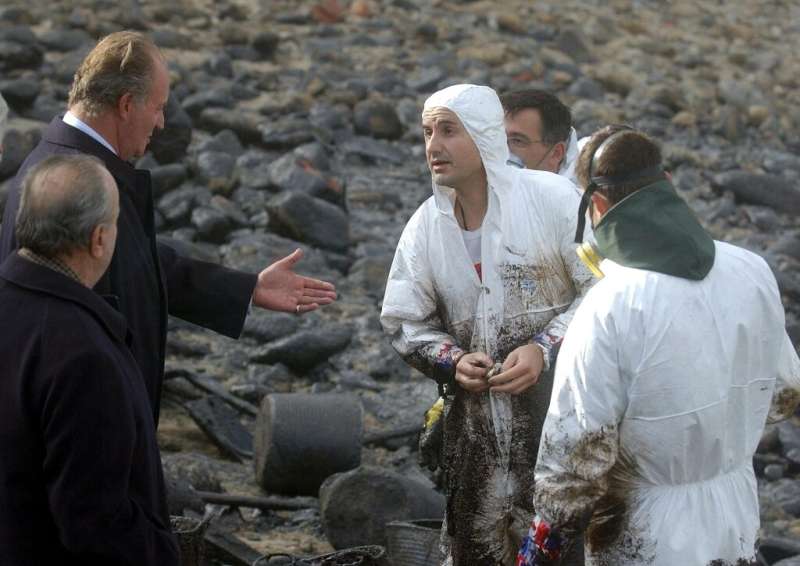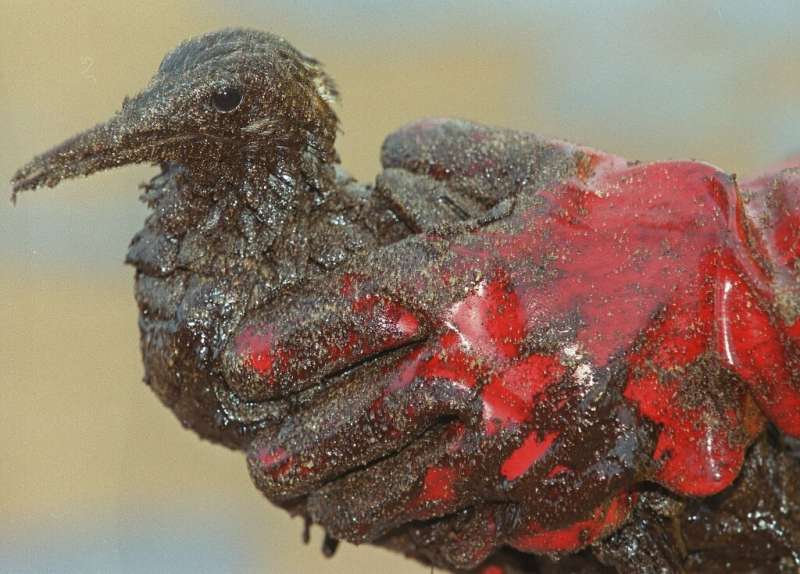Nightmare Atlantic oil spill 'could happen again'

It was one of Europe's worst-ever environmental disasters.
But 20 years after the oil tanker "Prestige" broke apart off northwestern Spain, covering thousands of kilometres (miles) of Atlantic coast with crude oil and killing 200,000 seabirds, some fear it could happen again.
The tragedy unfolded just off one of Spain's most scenic coastlines, turning the beaches of Galicia "black", devastating the region's fishing industry and leaving a trail of death and damage as far as France and Portugal.
The shock is still raw two decades on, said Alberto Blanco, former mayor of the seaside town of Muxia, close to where the single-hulled Bahama-flagged Liberian tanker first got into trouble during a storm on November 13, 2002.
The crew issued a distress call after a gaping hole several metres wide appeared in the ageing vessel's hull.
As soon as he heard the news, Blanco recalled rushing to the seafront and seeing the vessel was "very close to the coast and that the situation was very serious.
"The ship was listing in very rough seas, with a swell that was six to eight metres (20-26 feet) high," he said.
The following day its 77,000 tonnes of heavy-grade fuel oil began leaking into the sea.
With the storm still raging, the Spanish authorities tried to tow the tanker further out to sea, in a controversial decision that went against an emergency plan drawn up by experts calling for it to be brought to port to contain the leak.
200,000 birds killed
After six days adrift, the vessel broke in two and sank some 270 kilometres off the Galician coast, coming to rest at a depth of 3,500 metres and causing the worst-ever oil slick on the Iberian peninsula.
"The scope of the catastrophe was enormous," with consequences "not only in Spain, but also in Portugal and France," said Sara del Rio, a researcher with Greenpeace Spain.
In all, the tanker spilled an estimated 63,000 tonnes of fuel oil into the Atlantic, coating nearly 3,000 kilometres of the coastline with foul black sludge and killing nearly 200,000 seabirds, despite the efforts of tens of thousands of volunteers.
"The rocks were full of black tar, and so were the beaches," Blanco recalled. "Cleaning them was incredibly difficult, because it was slimy and sticky, and it just came back again with the tide, which gave you a sense of impotence and rage.
"It was a never-ending battle."
After a cleanup that lasted months, and a complex trial that took years, Spain's Supreme Court in 2016 found the tanker's skipper, its British insurer The London P&I Club, and Liberian owner Mare Shipping Inc liable for the disaster.
It sentenced the Greek captain, Apostolos Mangouras—who was 67 when the "Prestige" went down—to two years in jail, and ordered that the owner and the insurer pay 1.5 billion euros ($1.5 billion) in compensation, mostly to the Spanish state.
Neighbouring France was awarded 61 million euros.
'Misguided decisions'
NGOs hailed the ruling, but expressed regret that no politicians were called to account despite the "disastrous" decisions taken by the Spanish government of right-wing premier Jose Maria Aznar and the Galician regional authorities.
"There were misguided decisions, such as moving the ship away from the coast instead of bringing it closer to a port to contain the impact," said Greenpeace's Del Rio.
"It caused the spill to spread in such a way that it was impossible to control it," she added, saying the court did not "draw all the necessary conclusions".
Since the "Prestige" spill, the EU has tightened maritime safety laws, banning single-hull oil tankers, ordering ship inspections in port and setting up the European Maritime Safety Agency.
But such measures have not entirely eliminated the risk of a new oil spill.
"At any moment a catastrophe like the 'Prestige' could happen again," said Del Rios.
"Firstly, because there are still ships transporting oil that are in poor condition. And secondly, because more and more fossil fuels are being transported."
© 2022 AFP
Black tides: worst oil spills in Europe

Twenty years ago Spain suffered its worst environmental disaster, when the Prestige oil tanker broke in two, spilling over 60,000 tonnes of fuel that blackened thousands of kilometres (miles) of Atlantic coastline.
The accident caused major damage to wildlife and the environment as far away as France and Portugal, as well as to the important fishing industry of the Galicia region, where thousands of volunteers took part in the clean-up.
Here are some other major spills in Europe's seas:
1999: Erika disaster in France
In December 1999, the Italian-owned Erika, chartered by French oil giant TotalFina, broke in two off France's northwestern coast, dumping 20,000 tonnes of heavy diesel oil into the ocean. Some 400 kilometres (nearly 250 miles) of coastline was polluted. Between 150,000 and 300,000 birds died.
In September 2012, a French court convicted TotalFina of negligence over the shipwreck and the communities affected were awarded compensation.
1996: Sea Empress sinks off Wales
In February 1996, the Liberian tanker Sea Empress sank near the port of Milford Haven in Wales.
The leakage of more than 70,000 tonnes of crude oil caused a major ecological disaster, killing some 20,000 birds.
1992: Spanish coast slathered in black
In December 1992, the Greek tanker Aegean Sea crashed into the rocks in a storm near the Spanish port of La Coruna, breaking in two and leaking 79,000 tonnes of fuel oil.
It then caught fire and burned for several days. Oil washed up along 200 kilometres of Galician coastline.
1991: Worst Mediterranean spill
In April 1991, Cypriot oil tanker Haven broke up while anchored off the coast of Genoa in Italy after an onboard explosion that killed six crew members and caused the loss of its cargo of 144,000 tonnes of crude oil.
The oil slick polluted Italy's Liguria coast as well as part of Provence in France. The clean-up operation lasted years.
1978: Crew wiped out in Galicia
In December 1978, the Greek tanker Andros Patria, which was carrying 200,000 tonnes of crude oil between Iran and the Netherlands got caught in a storm off northwestern Spain.
Its hull cracked near La Coruna and the ship caught fire. Thirty-four of the 37 sailors aboard drowned and nearly 50,000 tonnes of oil were released into the Bay of Biscay.
1978: US supertanker hits the rocks
In March 1978, the US-owned supertanker Amoco Cadiz sank off the western tip of Brittany, France, dumping 230,000 tonnes of crude oil and polluting 360 kilometres of coastline.
The biggest marine oil spill in Europe's history had a devastating impact on marine fauna and flora.
In 1992, after 14 years of proceedings, the Amoco oil company was ordered to pay a 160 million euros ($160 million) to the French state and 35 million euros to local victims.
1967: Europe's first major 'black tide'
In March 1967, the Liberian-registered Torrey Canyon supertanker leaked every drop of its nearly 120,000 tonnes of crude oil when it ran aground near the Scilly Islands off Britain's southwestern coast.
Beaches in Britain and Brittany suffered the fallout of Europe's first major "black tide", as such slicks became known in France.
© 2022 AFP
No comments:
Post a Comment